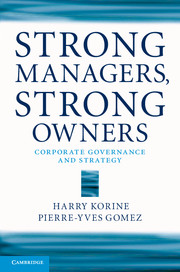Book contents
- Frontmatter
- Contents
- List of Figures
- List of Tables
- Foreword
- Acknowledgments
- Introduction
- Part I Changes in the identity of ownership and management
- 1 Change in ownership
- 2 Change in management
- Concluding remarks
- Part II Changes in the form of ownership and organization
- Part III Changes in strategy
- Part IV Implications for corporate governance
- Notes
- Index
- References
Concluding remarks
from Part I - Changes in the identity of ownership and management
Published online by Cambridge University Press: 05 December 2013
- Frontmatter
- Contents
- List of Figures
- List of Tables
- Foreword
- Acknowledgments
- Introduction
- Part I Changes in the identity of ownership and management
- 1 Change in ownership
- 2 Change in management
- Concluding remarks
- Part II Changes in the form of ownership and organization
- Part III Changes in strategy
- Part IV Implications for corporate governance
- Notes
- Index
- References
Summary
We have presented two frameworks for describing the identity of shareholders and managers, respectively. Although they differ in terms of how are they defined, both of these frameworks revolve around the same core concepts: values and methods. Essentially, therefore, the analysis of the effect of a change in the identity of ownership or management on strategy and governance can be focused on a review of how the values and methods of ownership or management have shifted with new shareholders and new managers. If, contrary to agency theory, shareholders are not all alike and managers are not all alike, then understanding different values and different methods provides a more accurate perspective on how shareholders and managers interact to shape strategy and governance.
Shareholders assure confidence in the firm; managers assure competence in the execution of the firm’s strategy. If the identity of shareholders or the identity of managers changes, both confidence in the future of the firm and competence in the execution of the firm’s strategy will be affected. How these changes in the identity of shareholders and managers play out in practice also depends to no small degree on the context. In Part I, we took form of ownership and organization for granted, but because form also influences the behaviors of economic actors, we need to explain how changes in legal and organizational form constrain or enable shareholders and managers and, ultimately, affect strategy and governance.
- Type
- Chapter
- Information
- Strong Managers, Strong OwnersCorporate Governance and Strategy, pp. 58 - 60Publisher: Cambridge University PressPrint publication year: 2013



